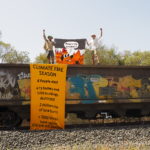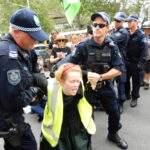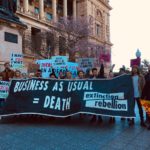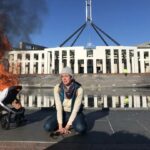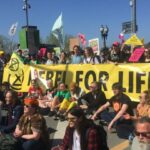Sentenced to Prison Over Nonviolent Climate Action: An Interview With Activist Sergeio Herbert
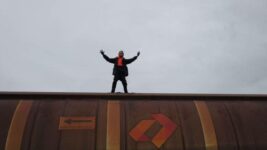
Social media platforms have recently lit up with praise for climate activist Sergeio Herbert, who, after being involved in a series of nonviolent direct actions conducted by Blockade Australia, was sentenced to 12 months in prison by a NSW magistrate.
The 18 November marked the final day of a series of Blockade Australia actions targeting Newcastle Coal Port. The climate resistance collective carried out a total of twenty direct actions against this facility, which is the largest port on the planet that deals in coal.
Now out on bail, Sergeio was sentenced to prison time over his part in the civil disobedience, which saw the port effectively brought to a halt over the entire period.
The young activist was arrested twice, but, on the second occasion, he wasn’t directly involved in any action.
Whilst people are impressed by Herbert putting himself on the line like this. His sentence raises two concerns. The first is that the 22-year-old’s future is at stake in receiving such punishment. And the second is whether this outcome signals an escalation in sanctioning over climate actions in general.
Suppressing climate dissent
On 24 November, Magistrate Janine Lacy sentenced Herbert to 12 months inside, with non-parole set at 6 months, while, on the day following, the Global Warning: The Threat to Climate Defenders in Australia report was released.
Produced by the Human Rights Law Centre, Greenpeace and the Environmental Defenders Office, the report finds that while advocacy and demonstration are the way that civil society makes its voice heard, over recent years, calls for stronger climate action have come “under sustained attack”.
Report researchers found that climate defenders are now “routinely receiving disproportionate and excessive penalties and bail conditions which restrict their freedom of association and assembly”.
Further, the organisations supporting these direct actions – both government and nongovernment – are either being defunded or threatened with deregistration, while corporations and governments that engage in infiltrating and surveilling climate activist groups “are rarely held to account”.
Developing political leverage
Taken in this context, Herbert’s prison sentence marks a further attempt at suppressing the voice of climate activists. And the police operation targeting the Blockade Australia actions – Strikeforce Tuohy – saw an intensification in the law enforcement response applied to such demonstrations.
But Sergeio sees his participation in civil disobedience aimed at forging climate action as a duty. The young activist commenced his demonstrating on leaving high school, and in 2019, when Extinction Rebellion began operating regularly in Brisbane, he was one of its most ardent protesters.
Sydney Criminal Lawyers spoke to Sergeio Herbert about why he is so willing to put his liberty at stake for the cause of climate, his belief that the federal government’s climate inaction is treasonous, and Blockade Australia’s next series of actions that are planned for Sydney in July.
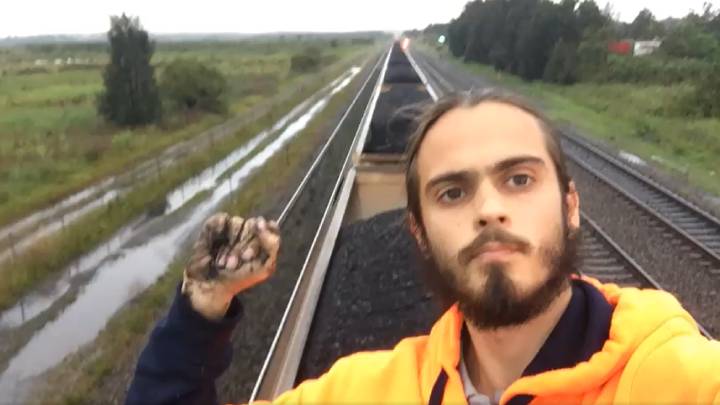
Sergeio, you were arrested for a second time in a fortnight going back two weeks ago in relation to ongoing nonviolent direct actions that Blockade Australia conducted targeting Newcastle Coal Port.
You were subsequently held on remand and then sentenced to 12 months imprisonment, with non-parole set at 6 months. Currently, you’re out on bail pending an appeal.
Your sentencing marks a significant escalation in the punishment that authorities are imposing in relation to climate actions. In your understanding, what’s going on here? Why the spike in severity of punishment?
There are three things to know about the context. The first is – as your readers may know – so far in relation to climate direct action, there have been no prison sentences.
Most sentencing for climate action – over 90 percent of it – has seen the issuing of fines. A small amount has seen community service orders, and I’ve also had probation.
There was a leap throughout the whole Blockade Australia mobilisation that saw magistrates sentencing to a community correction order, which is a higher sentence than a fine. So, that’s an escalation in itself.
In NSW, community orders have been more of a thing than in other states. So, the discourse in terms of sentencing in NSW has that as more of an option than elsewhere.
The primary purpose of law enforcement and the judiciary is to protect capital and the ownership of property and labour. So, when we’re doing these explicitly targeted actions the courts, in general, around Australia are harsher.
In the first context, that often means higher fines, and, in rare circumstances, police not granting bail.
The second point is that the courts impose slightly or significantly higher punishments for actions around ports, such as with the Adani port in Bowen, as well as other rail infrastructure actions, which, over the last couple of years, have mostly involved action on coal.
The third point is that in the Newcastle area, there hasn’t been a lot of direct action in the last few years. This means that there’s no discourse that the body of magistrates are used to when dealing with protesters in general, and, in this case, protesters using direct action tactics.
So, this results in more variability in law enforcement and the way in which the judiciary reacts to it.
When you have a history of interacting with the courts and the police, you get a stabilisation where everyone kind of knows what’s going to happen.
Often what does happen with people protesting is usually the punishment starts off quite harsh in one particular area, and through the continual resistance, it will often decrease.
There are obviously points where protest tactics may escalate and so too will the response to them. But, in general, when the tactics stay the same, the punishments will decrease because the courts end up seeing a variety of people that are well respected coming before them.
When a direct-action campaign starts out, it will involve people who are particularly politically motivated. They might be younger with less to lose. But, basically, the people at the front are going to be your classic hippies or ferals.
Then, as the campaign continues, older people and others from the general population come on board, because it’s been shown as a way that you can do political struggle in a particular area. Therefore, the participant base will diversify.
So, that’s the reason that overall, there tends to be a trend towards less repression. And what’s happening here is a combination of those three factors.
There is pressure on law enforcement to be repressive and to use a lot of resources to stop us coming from politicians. As you could see with Strikeforce Tuohy, it had helicopters, dog squads and 24/7 patrols of access points.
So, it seems in this case, the judiciary is confused and doesn’t know how to react to ridiculous charges police are laying on people.
For example, some of the protesters have been charged with attempting to kill or seriously injure a person by attempting to derail a train.
Those charges are severe, and the court doesn’t usually deal with them, especially for protesting. So, there’s a lot of confusion in the court, and they’re just going along with the severe police repression.
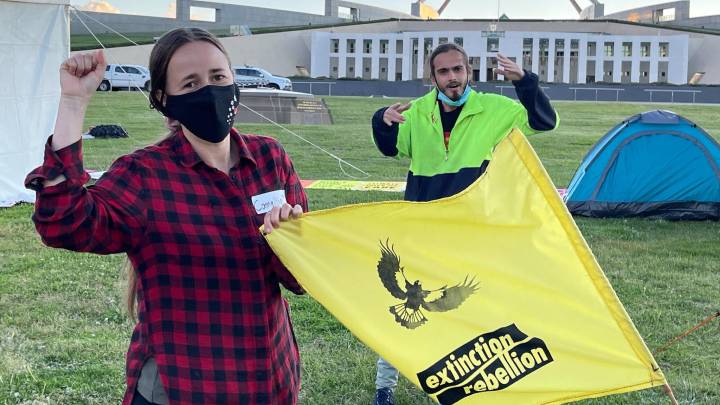
What actually led to your two arrests? And what have you been convicted of?
My first arrest involved me climbing on top of a coal train. There were three actions that day. In the morning, two older activists climbed on top of a coal train further along the track. Once they were off and the rail started again, we stopped the corridor and I climbed on top of a train.
I was there for almost five hours. It was storming and the police took a while to bring me down because they couldn’t order a cherry picker to the location.
For that, I was given a community correction order. However, I thought the order requires consent. And this is a question to be explored, because while the magistrate didn’t ask for my consent in the courtroom, ultimately, I was asked for it when the paperwork was put in front of me.
I didn’t give my signature, and I was then transferred to Kariong Prison. And after just over 24 hours, I was released for no apparent reason. There was no upcoming court date, and I never entered into the CCO. I was released with a note saying I hadn’t entered into the order.
The second arrest saw me and my friend Jarryd walking quite a distance away from the port. We were about eight kilometres from it. There is an island that the coal port is on, and we were exploring the wetlands there.
So, we’d had a morning walk and we were sitting by the road. The police then drove past and said, “Come here, boys.” But we decided to run away because we thought they might arrest us – I guess, for good reason.
Eventually, we were caught by a police dog search unit. We were then taken to the watchhouse, and after 12 hours, we were charged with attempting to obstruct a railway or stop a locomotive and attempting to hinder mining equipment.
I pleaded guilty to the charges, because I wanted to get it over and done with – expecting to get a fine and move on – even though I wasn’t guilty of the charges.
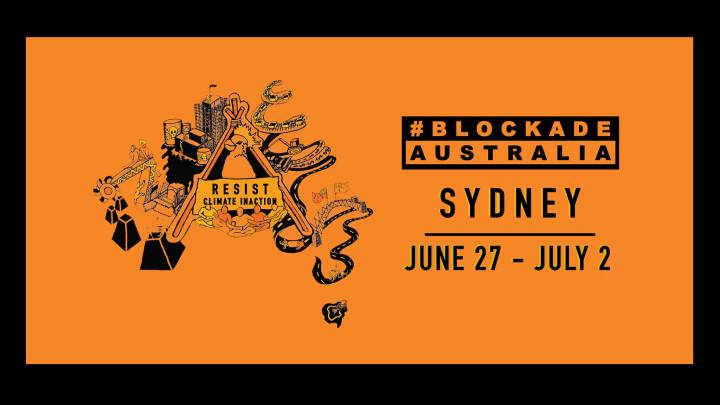
Blockade Australia is a recently formed resistance collective of climate activists. It’s first operation targeted Newcastle Coal Port with 20 separate direct actions.
Did this prolonged targeted action mark an escalation on the part of climate activists?
Blockade Australia is an intentional escalation in climate activism. What it’s looking to do is demonstrate and train people on how to build political leverage for negotiations into climate action.
This is because we live under a capitalist system, where money talks.
I said in my livestream while stopping the coal train that what I was doing was voting, because our democracy, and our representation in it, isn’t working. But direct action is a vote. It’s a vote on stopping the money, which politics is ultimately in service to.
So, what Blockade Australia is looking to do is conduct concentrated periods of mobilising to develop the political leverage until the government meets any demands that we might have through negotiations.
We’re actually looking to find a way to meaningfully negotiate with Australia, and we’re looking to transform the way that political struggle within the climate movement actually happens.
Instead of trusting that petitions and marches on the street will work – because obviously they haven’t – we’re looking to go back to the roots of civil disobedience, which is getting in the way of your opponent until your opponent decides to cooperate.
This is Negotiation Tactics 101. We are using grassroots mechanisms to affect the money, because Australia is ultimately an exploitative corporation looking to extract profit and resources from this country.
In Sydney next year, we’ll be doing this in the capital. The capital city is Sydney, because it’s got the most people and the strongest economic throughput.
What we’ll be doing is getting in the way of the economic system through its bottlenecks – mostly transportation.
We will be using the basic nonviolent civil disobedience tactics of putting bodies in the way of the destruction and the exploitation of this land.
Hopefully, what we’ll be able to do is transform the climate movement into a movement that’s participating in politics in the way that politics is actually run, rather than the delusion that our representatives will fight for us – because they clearly aren’t.
Our protesting on the street, our petitions and our voting hasn’t worked.
The climate movement picked up in this country in 2019, right before the Black Summer of bushfires. You were prominent in the actions being taken around Brisbane that same year.
Since then, you’ve been involved in actions along the eastern seaboard, and you were present at some of the recent XR actions in Canberra.
You’re 22. You’ve been doing this since you left high school. And at a time when the regular thing to do is start looking towards a career, you’re putting your liberty on the line.
Why are you doing this?
I joined Extinction Rebellion in 2019. And since June that year, I have been arrested 29 times for acts of civil disobedience.
Since then, there has been a massive uprising in this country, which, ultimately, was repressed by COVID. But it’s coming back because of the severity of the crisis and the fact that nothing is being done.
When I was 15, I was faced with the question of what am I doing here? What career am I going to have? And what life do I want to live?
Triggered by my understanding of the threat of climate change, I decided my purpose in life was to prolong the existence of consciousness in the universe, which is limited and isolated on Earth.
I value being alive. I value being able to participate in the universe and observe the beauty of it. To me, that meant that I was going to devote my life to stopping climate change.
So, I decided to try hard at school, which I hadn’t done before. And I did really well. I moved to another state to go to university. And I knew I had to put all my essence into this work.
When it was clear to me that the science was in – and what’s needed now is to wrestle our society into accepting the science and adopting the solutions – what I had to do became obvious.
So, I got involved with Frontline Action on Coal. I spent many months living at a blockade camp in Central Queensland, blocking the Adani coal port.
When Extinction Rebellion came along, because of its understanding of the need for structural change through mass participation in civil disobedience, I found it to be coherent and the solution that we need.
So, that’s why I decided to stop going to uni and spend all of my time on this kind of work. When I put my liberty on the line, I feel grounded in the fact that I’m just doing what I know I have to do.
The situation is if I don’t put my liberty on the line – if I don’t suffer now – we are all going to face annihilation.
In terms of risking future job prospects, or risking things about my life like spending it in gaol, the situation is I am not trying for that.
What I am doing is protecting my life and protecting the prosperity of my generation. I am putting food on the table by trying to stop climate change.
What drives me all the way is the fact that my job, the stability of my future, my freedom, and – in a way – my dignity, have already been stolen by the previous and current generations that run this society. They’ve decided to destroy it.
So, my future has already been stolen and what I am doing with this civil disobedience is reclaiming my ability to live on this planet.
The Morrison government’s approach to the climate crisis has been negligible. The PM’s performance at the COP26 with his accompanying net zero by 2050 non-plan are only the tip of the iceberg.
How would you describe what’s happening in this country in relation to the escalating climate emergency?
I describe the actions of this government as treason because what the institution of Australia is doing is destroying its future prospects.
So, that is why it’s treason, because it’s killing its future, which is the young people.
Lastly, Sergeio, a lot of people around the nation are very impressed by what you’ve done. But they’re also very concerned that you might end up doing hard time, especially as you’re so young.
How are you feeling about all this?
Everyone under 50 is going to be doing hard time. That’s what’s locked in with the climate crisis –whether we win or not, we’re at least doing hard time.
Hard time is a privilege because what failing means is no time at all. What failing means is mass starvation. It means war. It means the breakdown of this society.
The breakdown of this society is locked in. That is hard time. So, what I am doing is bringing my struggle forward, in order to prevent future struggles.
If I don’t do this then I should expect to starve to death, or to die after being conscripted into a water war or because I have resources that I’m not sharing with my neighbour who needs them, and they collect them with violence.
What that means is the climate crisis is a death sentence, so I am prepared to die in my struggle, because we’re all going to die anyway.
We are facing the illegal invasion and occupation of this country, and if we are going to fight it, we can’t just assume that we’re going to be able to continue with our jobs and have our nice lives.
Climate change is already taking this away from us. And that’s what gives us the freedom – the liberty – to do the intense struggle that’s required to protect life on Earth and get rid of the illegal occupation of this land called Australia.
That’s what Blockade Australia is about. We’re not looking for compromise. What we are looking to do is tell the institution of Australia – which is destroying the people of the land – to fuck off.
What we want to do is replace it.



